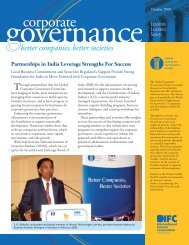SME Finance Policy Guide
SME Finance Policy Guide
SME Finance Policy Guide
Create successful ePaper yourself
Turn your PDF publications into a flip-book with our unique Google optimized e-Paper software.
74 GLOBAL PARTNERSHIP FOR FINANCIAL INCLUSION<br />
more adversely affected than other clients (consumers,<br />
large corporates) by Basel III, and an objective evaluation<br />
of the potential impacts may be merited. The<br />
gradual implementation of the new Basel III rules<br />
(which are to be fully adhered to by 2019) gives banks<br />
time to adjust to the new capital requirements.<br />
Enabling Regulatory Frameworks<br />
for Alternative <strong>SME</strong> <strong>Finance</strong><br />
products: Leasing, Factoring<br />
Factoring is an important source of working capital<br />
finance for <strong>SME</strong>s, and leasing is an important source of<br />
investment finance for <strong>SME</strong>s, especially in jurisdictions<br />
where the financial infrastructure is deficient.<br />
A legislative framework for leasing should: i) clarify<br />
rights and responsibilities of the parties to a lease; ii)<br />
remove contradictions within the existing legislation;<br />
iii) create non-judicial repossession mechanisms; iv)<br />
ensure that tax rules are clear and neutral, removing<br />
any bias against leasing; and v) clarify the rights of lessors<br />
and lessees under bankruptcy.<br />
The laws governing contracts between parties and<br />
assignment of receivables are most directly relevant to<br />
factoring. Where these laws are clear and enforceable,<br />
factoring has developed without any specific legal or<br />
regulatory framework for factoring as such. A major<br />
area for decision in a regulatory framework for factoring<br />
is determining the criteria for the entities who will<br />
be allowed to perform factoring activities.<br />
Competition<br />
Competition can be a powerful incentive for financial<br />
players to develop their <strong>SME</strong> business. Based on best<br />
practices around the world, competition can be promoted<br />
through the following measures:<br />
• Financial sector liberalization and banking regulations<br />
that allow the entry of sound and efficient<br />
banks and other types of financial providers;<br />
• A legal and regulatory framework that promotes the<br />
development of alternative lending technologies<br />
such as leasing and factoring, as well as the development<br />
of securities markets and institutional investors<br />
as an alternative to bank lending;<br />
• An antitrust authority that oversees decisions pertaining<br />
to mergers and acquisitions and weighs the<br />
pros and cons of these transactions;<br />
• A competition authority that is ready to act against<br />
potential cartels influencing the pricing of bank<br />
products;<br />
• Greater transparency and more information dissemination<br />
about the pricing and conditions of bank<br />
products, in order to empower borrowers to make<br />
good decisions and to “shop for the best deal.”<br />
Financial literacy could also help borrowers make<br />
better decisions and would pressure banks to offer<br />
more suitable products.<br />
• A consumer protection agency that watches out for<br />
evidence of anticompetitive behavior of banks and<br />
takes the matter up with the competition authority;<br />
• Efforts to improve the scope, access, and quality of<br />
credit information among banks, which would level<br />
the playing field between large and small banks<br />
(including new foreign banks) and allow these<br />
banks to expand more rapidly; and<br />
• Complementary prudential regulation, and coherence<br />
between competition policy and regulation in<br />
the financial sector, to minimize any potential destabilizing<br />
effects from increases in competition.<br />
LDC policymakers often have only a limited range of<br />
effective tools and capacity, however, to set up or<br />
enforce competition measures, such as a competition<br />
authority. In the interim, bank supervisors could be<br />
given a clear mandate to promote sound competition<br />
in the banking sector. For example: i) bank regulators<br />
should give greater weight to sound competition<br />
when implementing licensing criteria; and ii)<br />
strengthening the credit concentration regime may<br />
also contribute to increased competition translating<br />
into access gains 91 (the latter could be achieved by<br />
91 World Bank, 2011, MENA Financial Sector Flagship



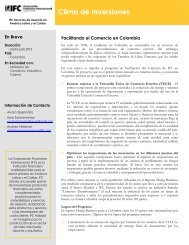
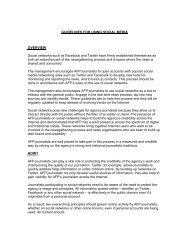
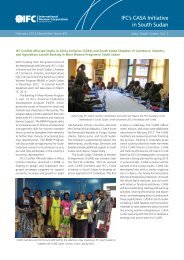
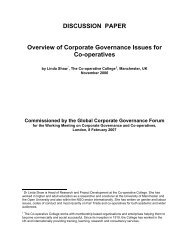
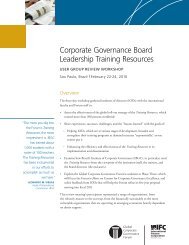

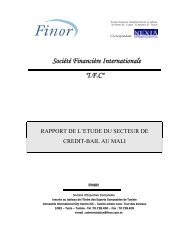


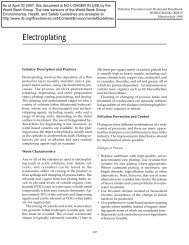

![Print a two-page fact sheet on this project [PDF] - IFC](https://img.yumpu.com/43449799/1/190x245/print-a-two-page-fact-sheet-on-this-project-pdf-ifc.jpg?quality=85)

